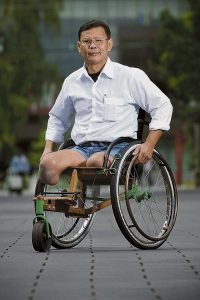by Beate Matthies
Some years ago I was working in a campaign against landmines together with Tun Channareth.

Tun is Cambodian and was only about 22 when he stepped on a landmine. We took part in many
events where Tun was talking about his experiences and where he was asked how he felt when
he lost both legs as a young man. He answered that he wanted to kill himself because he didn’t
think he could be of use anymore.
His friend saved his life.
Nobel Prize
Today, Tun Channareth is the amputee ambassador who doesn’t just promote a world without
landmines, but has given hope to many thousands of Cambodians who have to find a new way of life after an accident with landmines.
He is a man full of enthusiasm and energy. In 1997 Tun was chosen to receive the Nobel Peace Prize on behalf of the International Campaign to ban landmines.
An unexpected new life. Useless because of a handicap?
I don’t know what the practice in Greece was before the Hippocratic Oath was introduced, but there might have been good reasons for obliging doctors not to harm the patient.
Euthanasia has had many faces in history. The word “euthanasia” means literally “good/beautiful natural death”.
However, dictators have used euthanasia to get rid of persons who were considered a burden to
society.
‘Unworthy’ lives
Hitler talked about “unworthy” lives, killing thousands of innocent victims who were handicapped or had mental health problems. Cardinal von Galen, a courageous German cardinal who was later beatified asked in his famous homily of August 3, 1941: “Do you, do I, have the right to live only as long as I am productive, as long as others think that I am productive?”
There are reports from Romania that during Ceausescu’s dictatorship (ended 1989), handicapped
or mentally ill patients, as well as people older than 65, would not get medical help — they
were considered useless for society.
In countries like the Netherlands, active euthanasia is possible. In the neighbouring country,
Germany, it is considered a crime. Some German cities at the Dutch border have had an influx
of Dutch senior citizens — they don’t trust their doctors any more.
A study at the University of Goettingen, Germany, from 2012 shows that in the Netherlands
there are more than 4000 euthanasia deaths every year. In 41 per cent of the cases it was the family who decided on the death. Only 14 per cent of those killed were able to express their wish.
Eleven per cent of those killed would have been able to express what they wanted, but were not
asked.
The reasons doctors gave for terminating those lives were “no chance of improvement” (60%) and that the families couldn’t cope with the situation anymore (32%).
A survey among doctors in the Netherlands shows that 38 per cent of euthanasia cases are not
registered as such.
For more than 20 years the Catholic and Lutheran Churches in Germany have organised an annual
“Week for Life”. This year’s campaign, which ended on April 25, was called “Dying in Dignity”.
Not the death cup
Cardinal Marx, the president of the German Catholic Bishops’ Conference, wrote in the preface
to the campaign’s booklet: “It is a shame for a society if the option for suicide is just another option among many others: care home, hospital, suicide. The level of humanity within a society depends on how this society deals with old, sick, weak or terminally ill persons.
Those persons need our care, not the death cup.”
Cardinal Marx promotes the development of a “Culture of Death” without fear, but with love.
If euthanasia becomes an option for people who have the strong desire to die, it might easily become an option for people who feel lonely or depressed. Would this really be “merciful killing”, even though merciful care might be able to change that desire? Tun Channareth is a beautiful example.
Sr Elizabeth Davis, a Canadian Sister of Mercy, reminded us recently during an interview that
we are all “Missionary Disciples”, from the unborn baby to the dying person — by creating love
around us!
Beate Matthies is the coordinator for the Mercy Spirituality Centre in Auckland.
From death wish, depression to being an amputee ambassador
Posted in News
Reader Interactions